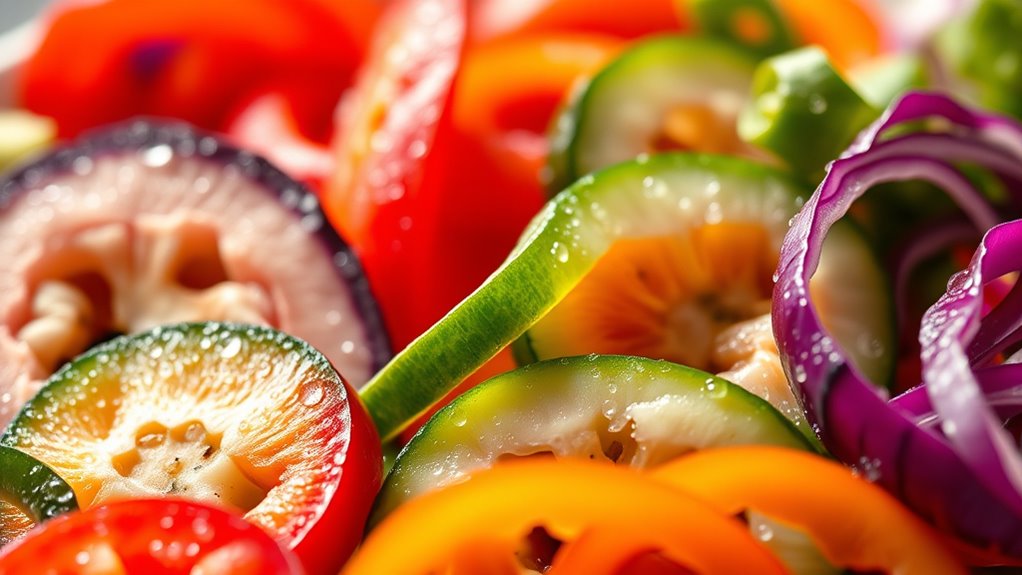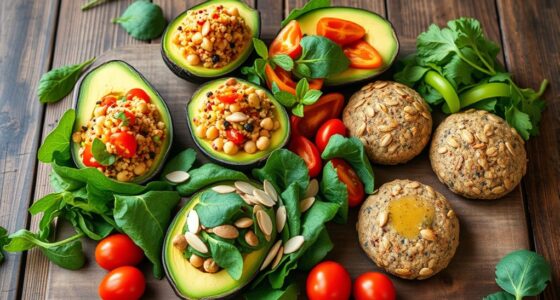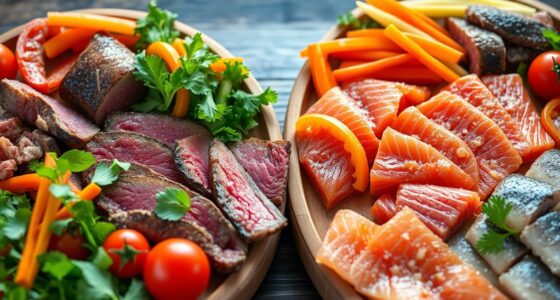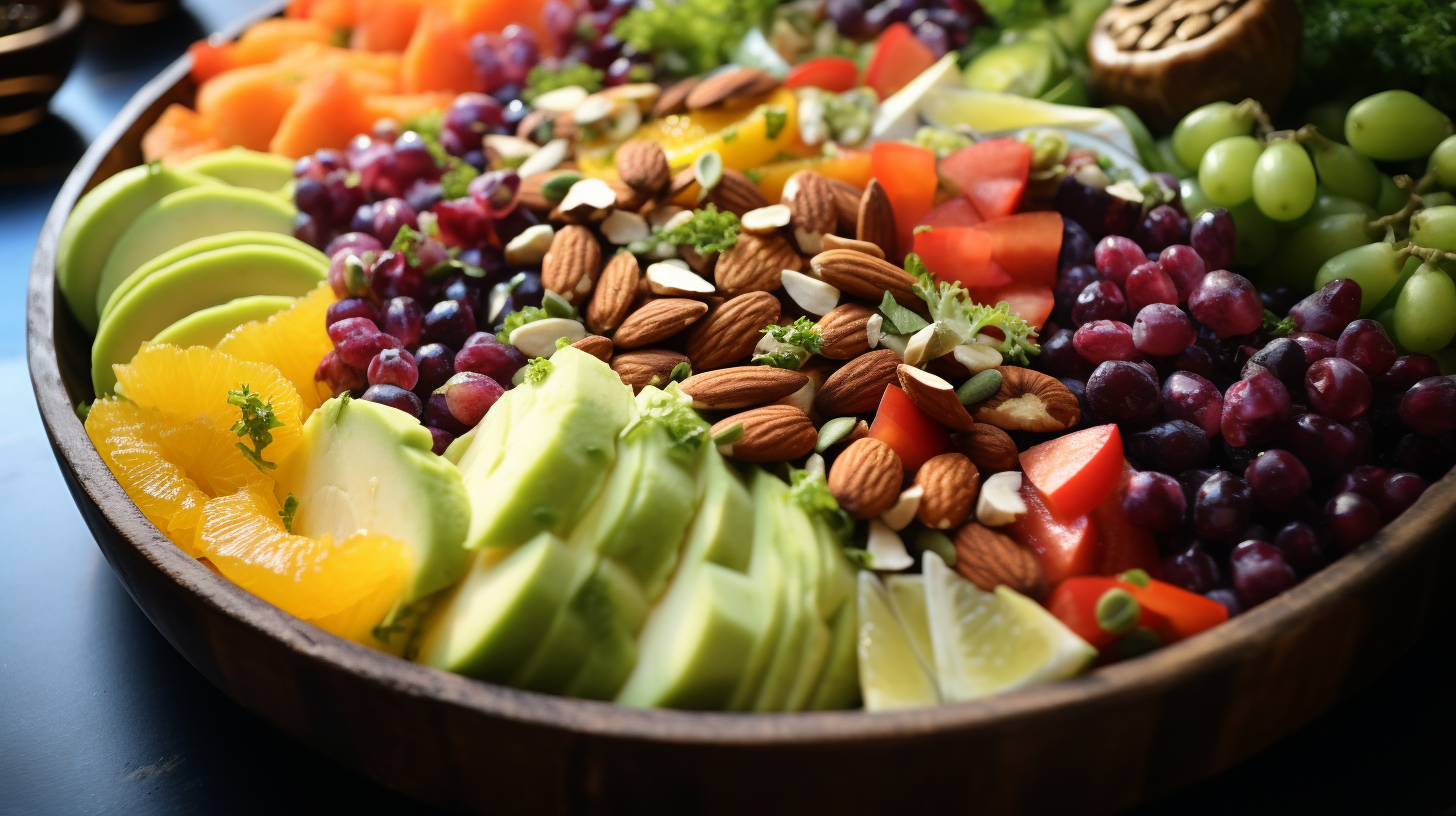Contrary to the myth that raw food is hard to digest, it actually contains natural enzymes and fiber that make digestion easier. The enzymes in raw produce assist in breaking down nutrients, while the fiber promotes healthy bowel movements and gut health. Proper chewing activates more enzymes and reduces discomfort. Over time, eating raw foods can improve your digestion and natural energy. Keep exploring to discover how raw foods can support your digestive well-being.
Key Takeaways
- Raw foods contain natural enzymes that aid digestion, making them easier to process than cooked foods.
- The fiber in raw produce promotes healthy bowel movements and reduces digestive discomfort when properly chewed.
- Heat-sensitive nutrients in raw foods support better nutrient absorption and overall digestive health.
- Properly chewed raw foods activate enzymes and lessen stomach strain, enhancing digestion.
- Incorporating raw foods gradually can improve digestive comfort and dispel the myth that they are too hard to digest.

Many people believe that raw food is difficult to digest, but this isn’t necessarily true. In fact, eating raw foods can sometimes be easier on your digestive system than cooked options. The key lies in understanding how enzyme activity and fiber content come into play. Raw foods naturally contain active enzymes that help break down nutrients, making digestion more efficient. When you cook food, many of these enzymes are destroyed by heat, forcing your body to produce more enzymes internally. While your body can compensate, having those enzymes already present in raw food can ease the workload, especially for individuals with digestive sensitivities. Additionally, the fiber content in raw fruits and vegetables plays a significant role. Raw foods tend to retain their natural fiber, which aids in regulating your digestive process. Fiber adds bulk to your stool, promoting healthy bowel movements and preventing constipation. It also supports a healthy gut microbiome by providing nourishment for beneficial bacteria. When you cook foods, some of the fiber’s structure might change or become less effective, though this varies depending on the method and duration of cooking. But overall, consuming raw foods ensures you’re getting the full benefit of their fiber, which can help your digestive system work smoothly.
Furthermore, the retention of heat-sensitive nutrients in raw foods can contribute to better absorption of certain vitamins and minerals, supporting overall digestive health. You might worry that raw foods are difficult to digest because of their tough textures or high fiber content. However, many people find that the fiber in raw produce actually helps their digestion by encouraging regularity and preventing bloating. The active enzymes in raw foods can assist in breaking down complex nutrients, reducing the likelihood of indigestion or discomfort. Plus, eating raw can support your body’s natural processes, since your digestive system is naturally adapted to handle these foods in their uncooked state. Incorporating a variety of raw fruits and vegetables into your diet can lead to improved digestion over time, especially when paired with proper chewing, which further activates enzymes and reduces strain on your stomach.
It’s also worth noting that raw foods can be gentler on sensitive stomachs because they don’t contain added fats or heavy cooking oils that sometimes cause indigestion. As long as you introduce raw foods gradually and chew thoroughly, you may find that your digestion improves rather than suffers. Overall, the myth that raw food is too hard to digest doesn’t hold up when you consider enzyme activity and fiber content. Instead, raw foods offer natural support for your digestive health, helping you feel lighter, more energized, and better equipped to absorb essential nutrients.
Frequently Asked Questions
Can Eating Raw Food Improve Digestion Compared to Cooked Food?
Eating raw food can actually improve digestion because it retains many of the cooking benefits, like enzymes that help break down food. Cooking benefits include easier digestion for some, but it also causes nutrient loss, which can reduce overall nutrient absorption. By eating raw, you preserve more nutrients, potentially making digestion smoother and more efficient. Just guarantee your raw foods are clean and prepared properly for safe, ideal digestion.
Are There Specific Raw Foods That Are Easier to Digest?
Think of your digestive system as a garden needing the right tools. Some raw foods, like ripe bananas and soft berries, are like easy-to-plant seeds, requiring less food preparation to reveal their digestive enzymes. These foods are naturally gentle, making them easier to digest. By choosing softer, less fibrous raw foods, you help your body access digestive enzymes more efficiently, easing the process and fostering a healthier, happier gut.
How Does Raw Food Affect Gut Bacteria Health?
Eating raw food positively impacts your gut bacteria health by promoting greater microbial diversity and supporting gut flora. Raw foods contain natural fibers and enzymes that help nourish beneficial bacteria, making digestion smoother. When you include a variety of raw vegetables, fruits, and nuts, you encourage a resilient and balanced microbiome, which can boost your overall digestion and immunity. So, raw foods can be a valuable part of maintaining a healthy gut.
Is Raw Food Suitable for People With Digestive Disorders?
Did you know that over 60% of people with digestive disorders find raw food easier to tolerate? If you’re considering a raw food detox, you might experience benefits like improved digestion and increased energy. Raw food’s culinary versatility allows you to enjoy fresh, nutrient-rich meals tailored to your needs. However, always consult your healthcare provider before making significant dietary changes, especially if you have digestive issues.
What Role Do Enzymes Play in Raw Food Digestion?
Enzymes play a essential role in raw food digestion by aiding enzyme activation, which helps break down nutrients efficiently. When you eat raw foods, your body benefits from these natural enzymes, boosting digestive efficiency. Unlike cooked foods, raw foods contain active enzymes that support better nutrient absorption and easier digestion. So, rather than being hard to digest, raw foods can actually enhance your digestive process through these critical enzymes.
Conclusion
Don’t buy into the idea that raw food is too tough to digest. In fact, it might surprise you how gentle it can be on your stomach. Sometimes, the grass is greener on the other side, and in this case, that means embracing raw foods for their natural enzymes and nutrients. So, give it a shot—you might find it’s not as hard as it’s cracked up to be, and your gut could thank you for it.










